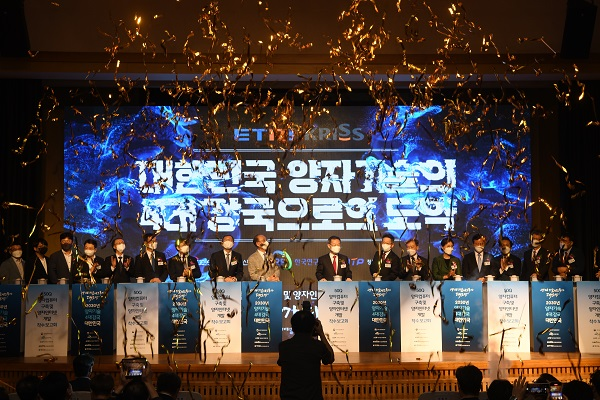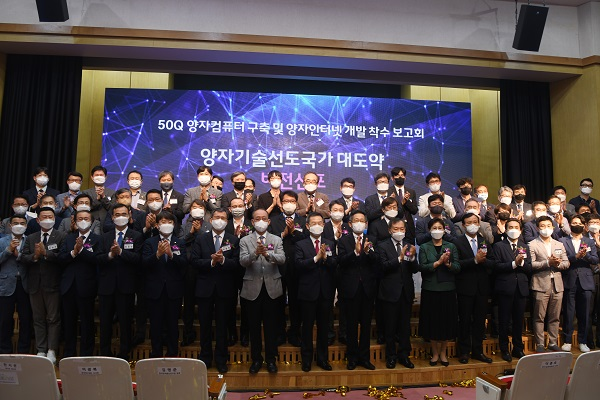Government aims to become one of the four major quantum technology powerhouses and commits about 95 billion by 2026
The government aims to become one of the four major quantum technology powers by 2030 and will work with industry and academia to build a 50-qubit quantum computer and develop a quantum Internet.
To this end, KRW 49 billion will be invested in the construction of quantum computing research infrastructure from this year to 2026, and KRW 45.6 billion will be invested in the development of core source technologies for the quantum Internet during the same period.
On September 9, Minister of Science and ICT Lee Jong-ho visited the Korea Research Institute of Standards and Science (KRISS) in Daejeon and held a “Report on the Construction of a 50-qubit Quantum Computer and the Commencement of Quantum Internet Development,” and discussed industry-academia cooperation plans, including the vision, goals, promotion strategies, and detailed schedules of each project in the future.
More than 100 officials from more than 50 organizations attended the event, including 24 participating organizations including KRISS and the Electronics and Telecommunications Research Institute (ETRI), the host of the two programs, and 29 partner companies for building and utilizing quantum computing, including LG, Samsung Display, POSCO, and RecuOn.
Minister Lee Jong-ho said, “The next five years are a very important juncture in the quantum ecosystem, and if we do not quickly pursue technology now, there may not be a chance to try again to secure the competitiveness of quantum technology.”
By 2026, KRISS plans to complete the construction of a 50-qubit superconductor quantum computer, making it the third country in the world to build its own 50-qubit quantum computer, after the United States and China.
Although there is a shortage of professional manpower and the supply and demand of key equipment and parts are not stable, it plans to overcome this by collaborating with Korea’s top researchers participating in projects such as SKKU, UNIST and KISTI and partner companies in the construction and operation of quantum computing, and by supporting strategic cooperation with leading overseas institutions and active participation of domestic industries.

ETRI and KIST plan to launch a pilot service for the quantum internet in 2036 and first develop early version of wired and wireless repeaters for quantum information transmission, which are impossible with existing networks, by 2026, and secure core quantum memory technologies essential for storing quantum information.
The development of quantum Internet technology is promoted on the premise of industry participation from the initial stage and based on close cooperation between industry and academia. This is to commercialize world-class quantum encrypted communication equipment and to continue the industry-academia collaboration system and success experience that has achieved leading international standards to quantum internet research.
The participants agreed that although the country is rapidly chasing the leading countries due to the recent government-led expansion of investment, the level of technology is still low and the scale of investment and manpower is absolutely insufficient, and in order to overcome this, challenging and compressed research and development such as the construction of a 50-qubit quantum computer and the development of core source technology for the quantum internet are necessary.
Minister Lee Jong-ho said, “Korea became the second country in the world to successfully communicate with Internet Protocol packets in 1982 and has become a world-class ICT powerhouse through the dedicated efforts of industry, academia, and government.”
In order to accelerate the gathering of domestic industry-academia associations and the creation of a virtuous cycle quantum ecosystem, the Ministry of Science and ICT will hold the ‘2022 Quantum Week (June 27 ~ July 1)’, and open the quantum-special graduate schools in August and the Korea-US Quantum Technology Cooperation Center as scheduled.
Taejin Kim tjk@zdnet.co.kr


